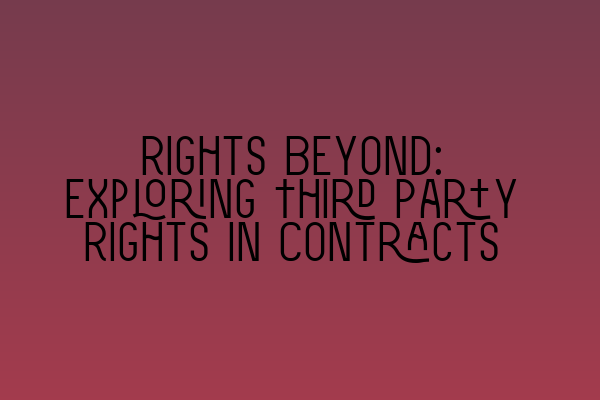Rights Beyond: Exploring Third Party Rights in Contracts
In the complex world of contract law, it is often assumed that only the parties to a contract have rights and obligations under its terms. However, there are instances where third parties may also have rights that arise from a contract. This concept of “third party rights” is an important aspect to consider when drafting, interpreting, and enforcing contracts.
Understanding third party rights is particularly crucial for solicitors and legal professionals preparing for the Solicitors Qualifying Exam (SQE). The SQE Contract Law exam covers various topics, including the basics of contract formation, terms, remedies, and the rights of third parties. To enhance your knowledge and preparation for the exam, you may find our related articles on SQE 1 Practice Exam Questions and SQE 1 Practice Mocks FLK1 FLK2 helpful.
What are Third Party Rights?
In its simplest form, a contract is a legally binding agreement between two or more parties. Each party involved in the contract has rights and obligations that are enforceable against each other. However, there are instances where the contract confers rights and benefits upon individuals or entities who are not parties to the contract. These individuals or entities are known as third parties, and their rights arise from the contract itself.
Third party rights can be granted in various ways. One common method is through an explicit provision within the contract. For example, Party A may enter into a contract with Party B and include a clause that allows Party C to enforce certain terms of the contract. This is known as an “intended third party beneficiary” arrangement. Party C, as the intended beneficiary, can enforce the rights and benefits granted to them by the contract, despite not being a party to the original agreement.
In addition to explicit provisions, third party rights can also be imputed by law in certain circumstances. These are known as “incidental third party beneficiaries.” Although they do not have a direct contractual relationship with the parties, the law recognizes their interest and allows them to enforce specific rights under the contract.
Enforcing Third Party Rights
Enforcing third party rights can be complex, as it involves navigating through legal principles, case law, and contractual interpretation. Legislation may also govern the enforceability of third-party rights in specific industries or sectors, adding an additional layer of complexity.
When it comes to enforcing third-party rights, parties must carefully consider the language and intention of the contract. The contract should clearly indicate the parties’ intention to confer rights upon third parties, whether explicitly or implicitly. A thorough understanding of the rules and principles surrounding third-party rights is essential to ensure the enforceability of such rights.
It is important to note that third-party rights may be limited or restricted by the terms of the contract itself. Parties may include clauses that restrict the ability of third parties to enforce certain rights, or they may require the consent of the contracting parties for the third party to exercise their rights. These limitations should be carefully drafted and negotiated to avoid potential disputes or ambiguity.
Implications and Considerations
Understanding third party rights is not only crucial for contract drafting and interpretation but also has broader implications in various legal and business contexts. For example, in corporate transactions or mergers and acquisitions, contractual arrangements may involve third parties with vested interests.
Moreover, legal professionals involved in commercial and corporate law must be well-versed in the complexities of third-party rights, as they often arise in the context of commercial contracts, joint ventures, licensing agreements, and other business arrangements. A solid understanding of the principles surrounding third-party rights can help solicitors provide comprehensive and effective advice to their clients.
If you are preparing for the SQE Contract Law exam, we highly recommend complementing your studies with practical application through our SQE 1 Preparation Courses and SQE 2 Preparation Courses. These courses are designed to provide you with extensive knowledge and practical skills required to excel in the SQE exams. Additionally, you can also explore the SRA SQE Exam Dates to stay updated on the exam schedule and plan your preparation accordingly.
In Conclusion
Third party rights in contracts are a crucial aspect of contract law that should not be overlooked. Whether you are preparing for the SQE Contract Law exam or practicing as a solicitor, understanding the intricacies of third-party rights is essential to ensure the validity and enforceability of contracts. By incorporating third-party rights into your contract drafting and interpretation skills, you will be better equipped to navigate the complexities of contract law and provide valuable assistance to your clients.
Related Articles:
- SQE 1 Practice Exam Questions
- SQE 1 Practice Mocks FLK1 FLK2
- SQE 2 Preparation Courses
- SQE 1 Preparation Courses
- SRA SQE Exam Dates
